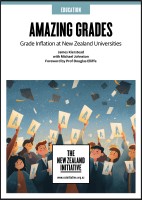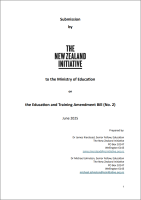Amazing grades
In my last Insights column, I explained what grade inflation is and why it’s bad. I also surveyed research showing that grade inflation is a problem at universities in the US, the UK, and Australia. Read more

James is an Adjunct Fellow at The New Zealand Initiative. His focus is on higher education policy, including academic freedom.
James holds a BA in Classics from Oxford, an MA in Ancient History from the University of London, an MA in Political Science from Stanford and a PhD in Classics from Stanford.
He is also the co-host, along with Michael Johnston, of Free Kiwis!, a podcast dedicated to discussing free speech in a New Zealand context. He can be found on Twitter at @Kleisthenes2.
Phone: 04 499 0790
In my last Insights column, I explained what grade inflation is and why it’s bad. I also surveyed research showing that grade inflation is a problem at universities in the US, the UK, and Australia. Read more
At universities across the English-speaking world, grades have been going up. At US colleges, As (A+, A or A-) are now the most common grade. Read more

Dr James Kierstead talked to Paul Brennan on Reality Check Radio about his report "Amazing Grades", which exposes how New Zealand universities have become increasingly generous with their grading over recent years. Dr Kierstead explained that the surge in high grades stems from academics adopting more lenient assessment practices rather than any genuine improvement in student ability, a pattern that became starkly evident during the pandemic. Read more
In this episode, Oliver talks to James Keirstead about his latest research report "Amazing Grades" which provides the first systematic analysis of grade inflation across all New Zealand universities. They discuss how A-grades have increased by 13 percentage points over two decades, reaching 35% of all grades awarded, and explore potential solutions including statistical moderation systems and national examinations to restore meaningful academic standards. Read more
Wellington (Tuesday, 26 August 2025) - Nearly half of all grades at the University of Auckland were As during COVID-19, part of a dramatic rise in top marks that cannot be explained by academic improvement, according to a new report released today. Amazing Grades: Grade Inflation at New Zealand Universities, published by The New Zealand Initiative, is the first analysis of grading patterns across all eight New Zealand universities. Read more
In this webinar, we launch our new report Amazing Grades: Grade Inflation at New Zealand Universities. Author Dr James Kierstead presents key findings on rising grades across NZ’s universities, joined by commentary from Professor Douglas Elliffe. Read more

Dr James Kierstead talked to Ryan Bridge on Herald Now about grade inflation at New Zealand universities, revealing that A grades have increased by 13 percentage points since 2006, with pass rates now above 90% at most institutions. Dr Kierstead argued this isn't due to students getting smarter but rather an "ethic of kindness" where academics give more accommodations, particularly highlighted during COVID when 49% of University of Auckland grades were A-range. Read more

Nearly half of all grades at the University of Auckland were As during COVID-19, part of a dramatic rise in top marks that cannot be explained by academic improvement. Amazing Grades: Grade Inflation at New Zealand Universities, is the first analysis of grading patterns across all eight New Zealand universities. Read more

‘Every five years or so, I crunch the numbers on college grades across the US and report what I’ve found,’ writes Stuart Rojstaczer modestly on his website. What Rojstaczer, a former professor, has found is that grades are going up, and have been going up for quite some time. Read more
Dr James Kierstead talked to Michael Laws on The Platform about the decline of academic freedom in New Zealand universities. Drawing from his report "Unpopular Opinions", Dr Kierstead highlighted numerous instances of free speech suppression, arguing that university managers have been instrumental in deep-platforming speakers and that legislative intervention is necessary to protect freedom of expression on campuses. Read more
Kia ora, colleagues! It’s me, your Vice-Chancellor. Read more
Dr James Kierstead presented to the Education and Workforce Select Committee on the Education and Training Amendment Bill (No.2). He spoke about academic freedom, presenting findings from the New Zealand Initiative's 50,000-word report "Unpopular Opinions, Academic Freedom in New Zealand". Read more
At midnight last night, submissions closed on the Education and Training Amendment Bill (No. 2). The bill would introduce new measures to protect academic freedom, which is defined in the Education and Training Act as ‘the freedom of academic staff and students, within the law, to question and test received wisdom, to put forward new ideas, and to state controversial or unpopular opinions.’ These measures are sorely needed. Read more
In this episode, James talks to Professor Ian Pace from City, Saint George's University of London about academic freedom, discussing the challenges facing universities, including political pressures, institutional neutrality, and the need for legislation to protect free speech and critical inquiry in academic settings. The conversation explores recent developments in academic freedom legislation in the UK and New Zealand, examining how universities are navigating complex issues of free speech, institutional policies, and the potential risks of political conformity in higher education. Read more

1. INTRODUCTION AND SUMMARY 1.1 This submission on the Education and Training Amendment Bill (No. 2) is made by The New Zealand Initiative (the Initiative), a Wellington-based think tank supported primarily by major New Zealand businesses. Read more